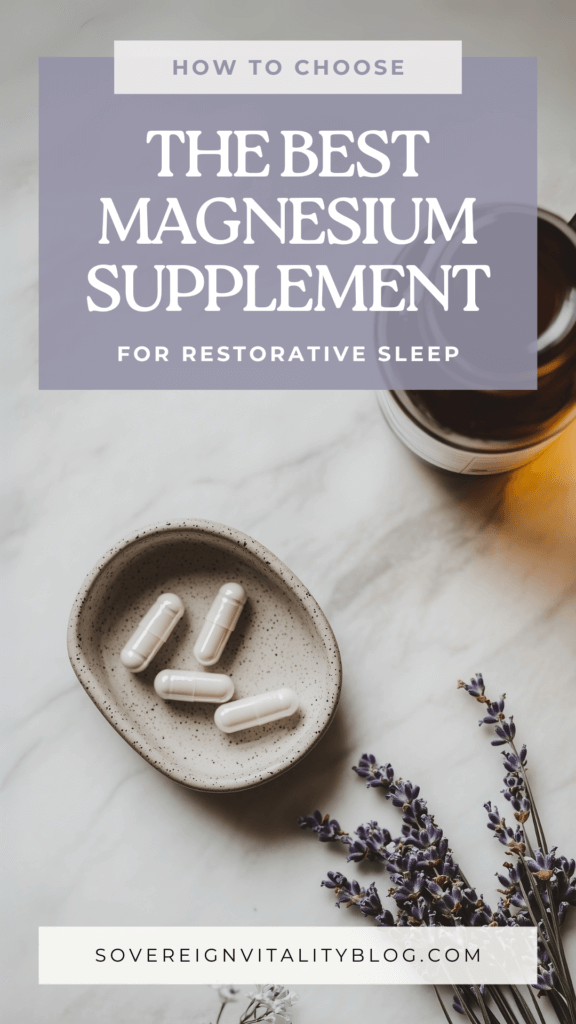This post may contain affiliate links, including those from Amazon Associates. If you make a purchase through these links, I may earn a commission at no additional cost to you. Learn more about our affiliate policy.
I know what it’s like to lie awake at night, staring at the ceiling, willing my mind to slow down. You’re exhausted, but somehow, sleep just won’t come.
Or maybe you finally drift off, only to wake up hours later, restless and frustrated. I’ve been there, and if you’re reading this, chances are you have too.
Sleep is natures healer. It’s how our bodies power down, reset, and recharge for the day ahead. Much like our electronics, this reboot time is an essential component for holistic wellness.

Yet so many of us struggle to get the deep, restorative rest we need. If you find yourself tossing and turning or waking up groggy no matter how many hours you sleep, your body might be missing something essential: magnesium.
Magnesium plays a powerful role in supporting the nervous system, calming muscle tension, and regulating melatonin – the hormone that tells your body it’s time to sleep. Without enough of it, you might experience anxiety, racing thoughts, or restless legs at night. And unfortunately, magnesium deficiency is incredibly common due to modern diets, stress, and soil depletion.
The good news? The right type of magnesium supplement can make all the difference in relaxing your body, quieting your mind, and promoting deep sleep. In this guide, I’ll walk you through the best forms of magnesium for sleep, how to take it for maximum effectiveness, and additional natural strategies that can help you fall asleep faster and wake up feeling refreshed.
Because when it comes to sleep, a single supplement isn’t always the whole solution. Your nighttime routine, diet, and lifestyle all play a role.
Let’s dive in and get you on the path to truly restorative rest.
The Science Behind Magnesium and Sleep

If you’ve ever struggled with falling or staying asleep, your body’s stress and sleep hormones might be out of balance. Magnesium plays a key role in calming the nervous system, regulating stress hormones, and supporting deep, restful sleep.
Recent research has shed new light on the power of magnesium for improving sleep quality. A 2024 randomized controlled trial found that participants taking 1 gram of magnesium daily experienced significant improvements in sleep duration, deep sleep, and sleep efficiency compared to those taking a placebo
How Magnesium Supports Sleep
Magnesium is involved in hundreds of bodily functions, but when it comes to sleep, it does three key things:
- Regulates GABA – GABA is the brain’s primary relaxation neurotransmitter. Magnesium increases GABA activity, helping quiet racing thoughts and ease stress.
- Reduces cortisol levels – High cortisol, the stress hormone, can keep your body in a state of alertness, making it difficult to wind down. Magnesium helps bring cortisol back to normal levels.
- Supports melatonin production – Magnesium plays a role in the body’s natural sleep-wake cycle by helping convert serotonin into melatonin, the hormone responsible for making you feel sleepy.
Signs of Magnesium Deficiency and Sleep Disruptions
Without enough magnesium, the nervous system can remain overstimulated, making it difficult to relax at night. Some common signs of deficiency that may impact sleep include:
- Restless legs or muscle cramps at night
- Difficulty falling asleep due to an overactive mind
- Waking up frequently or experiencing light, fragmented sleep
- Feeling tired despite getting enough hours of sleep
Choosing the Right Magnesium for Sleep

Not all magnesium supplements work the same way. Certain forms, like magnesium threonate and glycinate, are more effective at crossing the blood-brain barrier and supporting relaxation. Others, like magnesium citrate, can help with muscle relaxation but may not be as calming for the nervous system.
For a well-rounded approach to sleep, magnesium also pairs well with:
- Glycine – An amino acid that promotes deep sleep and relaxation.
- Taurine – Helps increase GABA activity, making it a great addition to a nighttime routine.
- L-theanine – Found in green tea, this compound calms the mind without causing drowsiness.
Understanding how magnesium works can help you choose the right type and dosage for better sleep. In the next section, we’ll explore the best magnesium supplements and how to take them for maximum effectiveness.
Which Magnesium Supplement Is Best for Sleep?
With so many magnesium supplements available, it’s important to choose one that actually supports sleep. Some forms are better for calming the nervous system, while others are more focused on muscle relaxation or cognitive function. Here’s a breakdown of the most effective types for sleep.
The Best Forms of Magnesium for Sleep
- Magnesium glycinate – One of the most absorbable forms, known for its calming effects on the nervous system. It binds to glycine, an amino acid that promotes relaxation, making it an excellent choice for those who struggle with anxiety-driven insomnia.
- Magnesium threonate – This form is unique because it can cross the blood-brain barrier, directly benefiting brain function. It has been shown to support cognitive health while also improving deep sleep quality.
- Magnesium citrate – A highly bioavailable form that helps relax muscles and ease tension. However, it has a mild laxative effect for some people, which can make it less ideal as a nighttime supplement.
- Comprehensive magnesium blends – Supplements that combine multiple forms of magnesium offer a well-rounded approach to relaxation and sleep support. These blends help cover different aspects of sleep, from nervous system regulation to muscle recovery.
Why a Full-Spectrum Magnesium Supplement Works Best
Since each form of magnesium plays a different role in the body, a well-formulated supplement should include multiple types to ensure optimal absorption and effectiveness. I highly recommend Magnesium Breakthrough because it is a full-spectrum magnesium supplement that contains all seven essential forms in a single formula designed to support sleep, relaxation, and stress reduction.
For those looking for a single, high-quality supplement that provides the benefits of multiple magnesium types, a full-spectrum blend may be the best option.
How and When to Take Magnesium for Sleep Optimization
Taking magnesium at the right time and in the right form can make a big difference in how well it supports sleep. While some people experience the best results by taking it before bed, others find that splitting their dose throughout the day works better for overall relaxation and stress management.
Best Time to Take Magnesium for Sleep
- 30–60 minutes before bed – This is the most common timing for sleep support and what I personally do, as it allows magnesium to be absorbed and start calming the nervous system before you try to fall asleep.
- Split dosing – Some people benefit from taking magnesium in smaller amounts throughout the day, with one dose in the morning to manage stress and another in the evening for relaxation.
- With food or on an empty stomach? – Magnesium can be taken with or without food, but some forms, like citrate, may cause mild digestive discomfort if taken on an empty stomach.
How Much Magnesium Do You Need?
The recommended daily intake varies based on factors like age, stress levels, and diet. In general:
- Men: 400–420 mg per day
- Women: 310–320 mg per day
- Pregnant or breastfeeding women: Slightly higher needs, typically around 350–400 mg
For sleep support, most people do well with 300–420 mg per day, but it’s best to start with a lower dose and adjust as needed.
Factors That Affect Magnesium Absorption
Magnesium absorption can be influenced by diet, stress levels, and other lifestyle factors. High stress, caffeine consumption, and certain medications can deplete magnesium levels, making supplementation even more important. Pairing magnesium with vitamin D and avoiding excessive calcium intake can also help improve absorption.
Magnesium vs. Other Natural Sleep Remedies
Magnesium is a powerful tool for improving sleep, but it works even better when combined with other natural sleep remedies.
While magnesium helps regulate the nervous system and promote relaxation, other supplements and lifestyle choices can enhance its effects, creating a more well-rounded approach to deep, restorative sleep.
How Magnesium and Melatonin Compare
Melatonin is often the go-to supplement for sleep, but it serves a different function than magnesium.
- Melatonin helps regulate the body’s circadian rhythm and is most effective for jet lag, shift work, or short-term sleep disruptions.
- Magnesium supports relaxation by calming the nervous system, making it better suited for long-term sleep support.
Since they work differently, some people find that taking them together improves their sleep, but magnesium alone is often enough to promote better rest without needing melatonin.
Herbal Supplements That Complement Magnesium

Certain herbs can further support relaxation and make it easier to fall asleep:
- Chamomile – Traditionally used for calming the mind and reducing stress.
- Valerian root – Known for its mild sedative effects and ability to promote deeper sleep.
- Passionflower – Increases GABA levels in the brain, similar to magnesium, helping to ease anxiety and quiet the mind before bed.
Pairing these herbs with magnesium can create a more effective sleep-supporting routine, especially for those who experience stress or anxiety at night.
I personally have a chamomile tea with lavender every night about 2 hours before bed. This primes my system to absorb my magnesium supplement and eases me into a restful night.
Supporting Sleep Through Diet
Getting enough magnesium from food can also help improve sleep quality. Some of the best natural sources include:
- Leafy greens like spinach and Swiss chard
- Nuts and seeds, particularly almonds, pumpkin seeds, and sunflower seeds
- Dark chocolate, which contains both magnesium and antioxidants that support relaxation
While diet alone may not provide enough magnesium for those with deficiencies, incorporating these foods alongside a high-quality supplement can help maintain optimal levels.
Explore 7 natural remedies for falling and staying asleep that you may not have heard of.
Creating a Holistic Bedtime Routine for Better Sleep

Magnesium can do a lot to support sleep, but a structured evening routine helps signal the body that it’s time to wind down, making magnesium even more effective. Small, intentional shifts in your nightly habits can improve sleep quality and help you wake up feeling truly rested.
Setting the Stage for Restful Sleep
A few simple adjustments can create an environment that supports deep, uninterrupted sleep:
- Limit blue light exposure – Avoid screens an hour before bed or use blue-light-blocking glasses to prevent melatonin disruption.
- Practice relaxation techniques – Deep breathing, meditation, or gentle stretching can help reduce stress and ease tension.
- Maintain a consistent sleep schedule – Going to bed and waking up at the same time each day helps regulate your circadian rhythm.
- Be mindful of evening nutrition – Avoid caffeine and heavy meals too close to bedtime, as they can interfere with sleep.
Final Thoughts: Choosing the Right Magnesium for Your Sleep Needs
Magnesium is one of the most effective natural sleep aids, but the best supplement depends on individual needs. Magnesium glycinate and threonate are particularly effective for promoting relaxation, reducing stress, and supporting deep sleep.
For those wanting a comprehensive approach, a full-spectrum magnesium supplement that combines multiple forms can provide broader benefits, helping to regulate neurotransmitters, relax muscles, and improve sleep quality.
Magnesium Breakthrough has been a god send for me, offering a science-backed blend of seven magnesium types to support the body’s natural sleep cycle. When combined with healthy sleep habits and other natural remedies, magnesium can help transform restless nights into deep, restorative sleep.
Here’s wishing you deep rest, every night!




